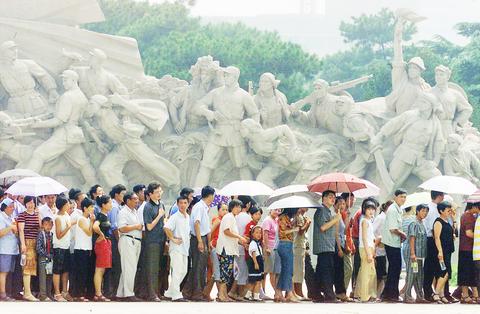The Chinese Foreign Ministry repeated its long-standing position yesterday that "there is only one China in the world and the mainland and Taiwan are both a part of China," as an initial response to Taiwan's President Chen Shui-bian's (陳水扁) remarks on Saturday.
Chen said that there is "one country on either side" (of the Taiwan Strait) and urged the public to seriously consider referendum legislation to allow 23 million Taiwanese to decide Taiwan's future.
Chen's comments sparked an immediate media frenzy as both the domestic and international media sought to interpret the remark and wondered what China's reaction would be.

PHOTO: REUTERS
Yesterday, a spokesman from China's Foreign Affairs Ministry told AFP and Reuters reporters that China would never tolerate an independent Taiwan.
"The separation of China's sovereignty and territorial integrity will never be tolerated," the spokesman said on condition of anonymity.
He said that a more official response would be issued by the Taiwan Affairs Office of China's State Council.
Some analysts have speculated that Beijing is buying time needed to integrate internal opinion before making a formal reaction.
The state-run China Central Television (CCTV) and XinHua News Agency both reported that Hong Kong's pro-Beijing newspapers carried stories warning that Chen's comments risked provoking the use of force by Beijing.
The pro-Beijing Wen Wei Po stated, "an official [in Beijing] reminded Chen Shui-bian and his partners not to play with fire again, not to wager the well-being of Taiwanese people in his gamble and not to lead Taiwan to a disaster."
Another Hong-Kong based pro-Beijing newspaper, Ta Kung Pao, carried a front page story with a spokesman from China's Taiwan Affairs Council reiterating that Taiwan was part of China, and any separatist move would not work.
Meanwhile, Taiwan officials said yesterday that the administration's cross-strait policy has not changed.
Vice Chairman of the Mainland Affairs Council Chen Ming-tong (
"China has never abandoned the use of force against Taiwan. It also continues to hamper Taiwan's diplomacy despite President Chen's repeated gestures of goodwill over the past two years," he said.
Chen Ming-tong stressed that the two countries can't ever replace or represent each other.
"President Chen's remarks merely reiterated this fact. The essence of Taiwan's cross-strait policy remains unchanged," he said.
In the private sector, responses were mixed.
Stanley Hsu (
"The status quo is the best solution. It is not the time for Taiwan and China talk about split or unification. Strong economic power can help promote our nation, not political status," Hsu said.
He stressed that the most important thing for the time being is boosting the nation's economy, and questioned why Chen would choose to make such bold comments now.
Hsu added that the remarks could make it more difficult for Taiwanese businesspeople to work in China.
But the president of the association's Guangdong Province branch, who spoke on condition of anonymity, said he is not worried about the president's rhetoric.
"We've gotten used to [Taiwan making provocative remarks toward China]. I think it has no influence on cross-strait relations. There shouldn't be any problem," he said.

‘DENIAL DEFENSE’: The US would increase its military presence with uncrewed ships, and submarines, while boosting defense in the Indo-Pacific, a Pete Hegseth memo said The US is reorienting its military strategy to focus primarily on deterring a potential Chinese invasion of Taiwan, a memo signed by US Secretary of Defense Pete Hegseth showed. The memo also called on Taiwan to increase its defense spending. The document, known as the “Interim National Defense Strategic Guidance,” was distributed this month and detailed the national defense plans of US President Donald Trump’s administration, an article in the Washington Post said on Saturday. It outlines how the US can prepare for a potential war with China and defend itself from threats in the “near abroad,” including Greenland and the Panama

The Chinese Nationalist Party (KMT) is maintaining close ties with Beijing, the Democratic Progressive Party (DPP) said yesterday, hours after a new round of Chinese military drills in the Taiwan Strait began. Political parties in a democracy have a responsibility to be loyal to the nation and defend its sovereignty, DPP spokesman Justin Wu (吳崢) told a news conference in Taipei. His comments came hours after Beijing announced via Chinese state media that the Chinese People’s Liberation Army’s Eastern Theater Command was holding large-scale drills simulating a multi-pronged attack on Taiwan. Contrary to the KMT’s claims that it is staunchly anti-communist, KMT Deputy

RESPONSE: The government would investigate incidents of Taiwanese entertainers in China promoting CCP propaganda online in contravention of the law, the source said Taiwanese entertainers living in China who are found to have contravened cross-strait regulations or collaborated with the Chinese Communist Party (CCP) could be subject to fines, a source said on Sunday. Several Taiwanese entertainers have posted on the social media platform Sina Weibo saying that Taiwan “must be returned” to China, and sharing news articles from Chinese state media. In response, the Mainland Affairs Council (MAC) has asked the Ministry of Culture to investigate whether the entertainers had contravened any laws, and asked for them to be questioned upon their return to Taiwan, an official familiar with the matter said. To curb repeated

Taiwan People’s Party (TPP) Chairman Huang Kuo-chang (黃國昌) yesterday appealed to the authorities to release former Taipei mayor Ko Wen-je (柯文哲) from pretrial detention amid conflicting reports about his health. The TPP at a news conference on Thursday said that Ko should be released to a hospital for treatment, adding that he has blood in his urine and had spells of pain and nausea followed by vomiting over the past three months. Hsieh Yen-yau (謝炎堯), a retired professor of internal medicine and Ko’s former teacher, said that Ko’s symptoms aligned with gallstones, kidney inflammation and potentially dangerous heart conditions. Ko, charged with